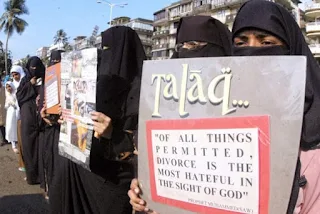
In
recent years, Muslim women in India have publicly raised issues of unfair
treatment at the hands of their unjust husbands, triggering wider debates on
the reform of Muslim personal law in a secular country. As it happens, an unscrupulous husband makes an oral pronouncement or a simple declaration of 'Triple Talaq’ by sending an e-mail/mobile phone text message/WhatsApp/Facebook/Twitter posts, etc.- to his wife and such a communication would apparently result in instant and irrevocable divorce, valid for the purpose of the Muslim law. For, ‘Talaq-e-Bidd’at’- an irregular form of divorce under Muslim Law- does seem to allow men to simply evade their marital obligations with their wives and to end the spouse relations without any regard for the ethical framework of the Qur’an and the Ahadith on matrimonial justice. Indeed, a grave distortion of the Islamic institution of divorce has been created in recent times by rotten husbands, leading to an unfortunate public perception that a Muslim husband may put away his wife at his mere caprice. Seeking to prohibit and penalize this kind of deviant practice -‘Talaq-e-Bidd’at’- that is tilted against Islamic values, women’s rights and gender justice; India recently announced a new national legislation entitled the ‘Muslim Women (Protection of Rights on Marriage) Act, 2019.





